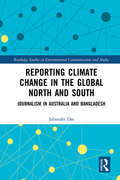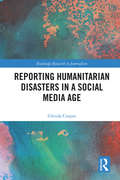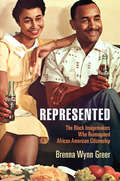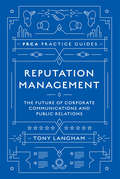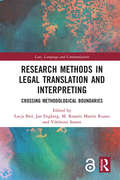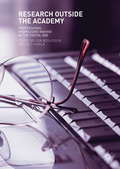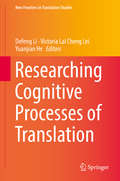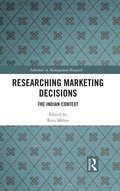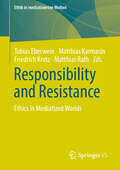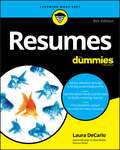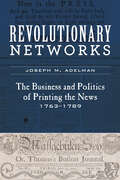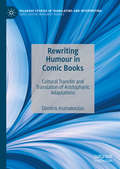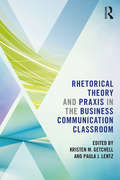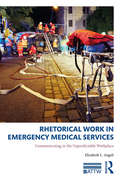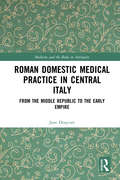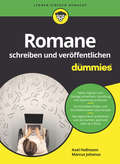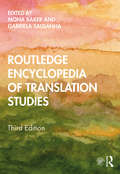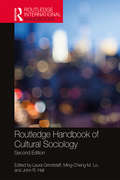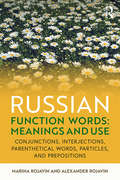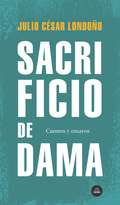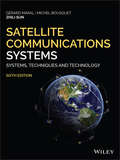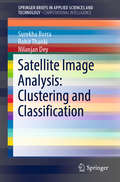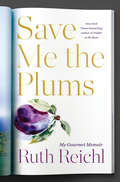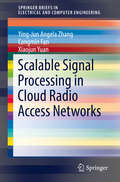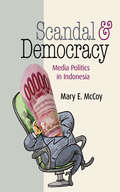- Table View
- List View
Reporting Climate Change in the Global North and South: Journalism in Australia and Bangladesh (Routledge Studies in Environmental Communication and Media)
by Jahnnabi DasThis book reveals how journalists in the Global North and Global South mediate climate change by examining journalism and reporting in Australia and Bangladesh. This dual analysis presents a unique opportunity to examine the impacts of media and communication in two contrasting countries (in terms of economy, income and population size) which both face serious climate change challenges. In reporting on these challenges, journalism as a political, institutional, and cultural practice has a significant role to play. It is influential in building public knowledge and contributes to knowledge production and dialogue, however, the question of who gets to speak and who doesn’t, is a significant determinant of journalists’ capacity to establish authority and assign cultural meaning to realities. By measuring the visibility from presences and absences, the book explores the extent to which the influences are similar or different in the two countries, contrasting how journalists’ communication power conditions public thought on climate change. The investigation of climate communication across the North-South divide is especially urgent given the global commitment to reduce greenhouse gas emissions and it is critical we gain a fuller understanding of the dynamics of climate communication in low-emitting, low-income countries as much as in the high emitters, high-income countries. This book contributes to this understanding and highlights the value of a dual analysis in being ably draw out parallels, as well as divergences, which will directly assist in developing cross-national strategies to help address the mounting challenge of climate change. This book will be of great interest to students and scholars of climate change and environmental journalism, as well as media and communication studies more broadly.
Reporting Humanitarian Disasters in a Social Media Age (Routledge Research in Journalism)
by Glenda CooperFrom the tsunami to Hurricane Sandy, the Nepal earthquake to Syrian refugees—defining images and accounts of humanitarian crises are now often created, not by journalists but by ordinary citizens using Twitter, Facebook, YouTube, Instagram and Snapchat. But how has the use of this content—and the way it is spread by social media—altered the rituals around disaster reporting, the close, if not symbiotic, relationship between journalists and aid agencies, and the kind of crises that are covered? Drawing on more than 100 in-depth interviews with journalists and aid agency press officers, participant observations at the Guardian, BBC and Save the Children UK, as well as the ordinary people who created the words and pictures that framed these disasters, this book reveals how humanitarian disasters are covered in the 21st century – and the potential consequences for those who posted a tweet, a video or photo, without ever realising how far it would go.
Represented: The Black Imagemakers Who Reimagined African American Citizenship (American Business, Politics, and Society)
by Brenna Wynn GreerIn 1948, Moss Kendrix, a former New Deal public relations officer, founded a highly successful, Washington, D.C.-based public relations firm, the flagship client of which was the Coca-Cola Company. As the first black pitchman for Coca-Cola, Kendrix found his way into the rarefied world of white corporate America. His personal phone book also included the names of countless black celebrities, such as bandleader Duke Ellington, singer-actress Pearl Bailey, and boxer Joe Louis, with whom he had built relationships in the course of developing marketing campaigns for his numerous federal and corporate clients. Kendrix, along with Ebony publisher John H. Johnson and Life photographer Gordon Parks, recognized that, in the image-saturated world of postwar America, media in all its forms held greater significance for defining American citizenship than ever before. For these imagemakers, the visual representation of African Americans as good citizens was good business.In Represented, Brenna Wynn Greer explores how black entrepreneurs produced magazines, photographs, and advertising that forged a close association between blackness and Americanness. In particular, they popularized conceptions of African Americans as enthusiastic consumers, a status essential to postwar citizenship claims. But their media creations were complicated: subject to marketplace dictates, they often relied on gender, class, and family stereotypes. Demand for such representations came not only from corporate and government clients to fuel mass consumerism and attract support for national efforts, such as the fight against fascism, but also from African Americans who sought depictions of blackness to counter racist ideas that undermined their rights and their national belonging as citizens.The story of how black capitalists made the market work for racial progress on their way to making money reminds us that the path to civil rights involved commercial endeavors as well as social and political activism.
Reputation Management: The Future Of Corporate Communications and Public Relations (PRCA Practice Guides)
by Tony Langham PrcaA good reputation is vital to success in business and in life. Organizations with the best reputations outperform rivals in a myriad of tangible ways; they recruit higher quality staff, succeed with smaller marketing budgets, and exert greater influence over Governments. Although in the long term reputation is based on reality and behavior, short term examples of organizations and individuals building unfair advantage can be seen all around us. Despite this, reputation remains an often misunderstood and neglected asset. <p><p>In Reputation Management: The Future of Corporate Communications and Public Relations, Tony Langham argues that reputation management is the future incarnation of public relations and corporate communications. Featuring specially commissioned essays, as well as exclusive interviews with leading CEOs, influencers and celebrities, the book covers issues as diverse as fake news, AI, James Bond, cyber security and internet bullying. Also included are contributions from thirty-nine of the world’s leading reputation managers who exclusively reveal the time they made the most difference to an organization's reputation.
Research Methods in Legal Translation and Interpreting: Crossing Methodological Boundaries (Law, Language and Communication)
by Łucja Biel Vilelmini Sosoni Jan Engberg Rosario Martín RuanoThe field of legal translation and interpreting has strongly expanded over recent years. As it has developed into an independent branch of Translation Studies, this book advocates for a substantiated discussion of methods and methodology, as well as knowledge about the variety of approaches actually applied in the field. It is argued that, complex and multifaceted as it is, legal translation calls for research that might cross boundaries across research approaches and disciplines in order to shed light on the many facets of this social practice. The volume addresses the challenge of methodological consolidation, triangulation and refinement. The work presents examples of the variety of theoretical approaches which have been developed in the discipline and of the methodological sophistication which is currently being called for. In this regard, by combining different perspectives, they expand our understanding of the roles played by legal translators and interpreters, who emerge as linguistic and intercultural mediators dealing with a rich variety of legal texts; as knowledge communicators and as builders of specialised knowledge; as social agents performing a socially situated activity; as decision-makers and agents subject to and redefining power relations, and as political actors shaping legal cultures and negotiating cultural identities, as well as their own professional identity.
Research Outside The Academy: Professional Knowledge-making In The Digital Age
by Lisa Börjesson Isto HuvilaThis book analyses the practical, information-related dimensions of professional knowledge making and communication in extra-academic organisations. It treats the sites where research takes place and where knowledge is created outside academia in the light, among other things, of new digital resources. It provides valuable insight into the practices through which extra-academic research data and results are produced and made available and the settings in which this takes place. With case studies of knowledge-making in government organizations and state research institutes, as well as in cultural and heritage institutions, this book broadens the perspective on knowledge sharing, communication and publication, and how knowing changes as a result of the professional knowledge-making practices in the digital age.Research outside the Academy is ideal for students at all levels looking for an introduction to the topic of research and knowledge-making in society. Moreover, researchers and professionals in the fields of library and information science and science and technology studies will find the book to be adding to previous understandings of scholarly documentation and communication.
Researching Cognitive Processes of Translation (New Frontiers in Translation Studies)
by Defeng Li Victoria Lai Lei Yuanjian HeThis edited volume covers an array of the most relevant topics in translation cognition, taking different approaches and using different research tools. It explores theoretical and methodological issues using case studies and examining their practical and pedagogical implications. It is a valuable resource for translation studies scholars, graduate students and those interested in translation and translation training, enabling them to conceptualize translation cognition, in order to enhance their research methods and designs, manage innovations in their translation training or simply understand their own translation behaviours.
Researching Marketing Decisions: The Indian Context
by Ritu MehtaThis book looks at customer value creation through marketing decisions and analyses the critical phases of theoretical and methodological advancements in solving certain problems and customer-centric issues that firms face. The chapters highlight how theories have been borrowed from sociology, psychology and economics to understand phenomena such as customer preferences and decision-making, and how operations research and statistical tools have been applied to take optimal decisions on marketing-related issues such as channel management and pricing. <p><p>The volume covers an array of topics including marketing orientation, consumer behaviour, and marketing mix comprising the elements of product, price, promotion and place. The articles offer both methodological and theoretical contributions, and also discuss some key results of implementation of marketing strategies by various firms. <p><p>This book will be of interest to researchers and students of marketing, consumer behaviour, business management, economics, finance, international marketing, services marketing and international business.
Responsibility and Resistance: Ethics in Mediatized Worlds (Ethik in mediatisierten Welten)
by Matthias Rath Matthias Karmasin Friedrich Krotz Tobias EberweinThe volume deals with the normative challenges and the ethical questions imposed by, and through, the developments and changes in everyday life, culture and society in the context of media change. It is thus concerned with the questions of whether and how the central concept of (enlightened) ethics must evolve under these premises – or in other words: what form do ethics take in mediatized societies? In order to address this question and to stimulate and initiate a debate, the authors focus on two concepts: responsibility and resistance. Their contributions try to shed light not only on the empirical shreds of evidence of change in mediatized societies, but also on the normative challenges and ethical possibilities of these developments.
Resumes For Dummies
by Laura DeCarloPolish up that old resume—and land your dream job We've all been there: it's time to apply for a job or internship and you have to create or revise your resume. Many questions pop in your head. What do employers want? What skills should I highlight? How do I format this? How do I get noticed? But resume writing doesn't have to be a daunting task. The latest edition of Resumes For Dummies answers all of these questions and more—whether you're a resume rookie, looking for new tips, or want to create that eye-catching winning resume. In this trusted guide, Laura DeCarlo decodes the modern culture of resume writing and offers you insider tips on all the best practices that’ll make your skills shine and your resume pop. Let's start writing! Write effective resumes that will stand out in a crowd Understand Applicant Tracking Systems and how to adapt your resume Keep your resume up with the current culture Position a layoff or other career change and challenge with a positive spin Leverage tips and tricks that give your resume visual power In order to put your best foot forward and stand out in a pile of papers, it’s important to have an excellent and effective resume—and now you can.
Revolutionary Networks: The Business and Politics of Printing the News, 1763–1789 (Studies in Early American Economy and Society from the Library Company of Philadelphia)
by Joseph M. AdelmanAn engrossing and powerful story about the influence of printers, who used their commercial and political connections to directly shape Revolutionary political ideology and mass mobilization.Honorable Mention, St. Louis Mercantile Library Prize, Bibliographical Society of AmericaDuring the American Revolution, printed material, including newspapers, pamphlets, almanacs, and broadsides, played a crucial role as a forum for public debate. In Revolutionary Networks, Joseph M. Adelman argues that printers—artisans who mingled with the elite but labored in a manual trade—used their commercial and political connections to directly shape Revolutionary political ideology and mass mobilization. Going into the printing offices of colonial America to explore how these documents were produced, Adelman shows how printers balanced their own political beliefs and interests alongside the commercial interests of their businesses, the customs of the printing trade, and the prevailing mood of their communities. Adelman describes how these laborers repackaged oral and manuscript compositions into printed works through which political news and opinion circulated. Drawing on a database of 756 printers active during the Revolutionary era, along with a rich collection of archival and printed sources, Adelman surveys printers' editorial strategies. Moving chronologically through the era of the American Revolution and to the war's aftermath, he details the development of the networks of printers and explains how they contributed to the process of creating first a revolution and then the new nation.By underscoring the important and intertwined roles of commercial and political interests in the development of Revolutionary rhetoric, this book essentially reframes our understanding of the American Revolution. Printers, Adelman argues, played a major role as mediators who determined what rhetoric to amplify and where to circulate it. Offering a unique perspective on the American Revolution and early American print culture, Revolutionary Networks reveals how these men and women managed political upheaval through a commercial lens.
Rewriting Humour in Comic Books: Cultural Transfer and Translation of Aristophanic Adaptations (Palgrave Studies in Translating and Interpreting)
by Dimitris AsimakoulasThis book examines comic book adaptations of Aristophanes’ plays in order to shed light on how and why humour travels across cultures and time. Forging links between modern languages, translation and the study of comics, it analyses the Greek originals and their English translations and offers a unique, language-led research agenda for cultural flows, and the systematic analysis of textual norms in a multimodal environment. It will appeal to students and scholars of Modern Languages, Translation Studies, Comics Studies, Cultural Studies and Comparative Literature.
Rhetorical Theory and Praxis in the Business Communication Classroom
by Kristen Getchell Paula LentzRhetorical Theory and Praxis in the Business Communication Classroom responds to a significant need in the emerging field of business communication as the first collection of its type to establish a connection between rhetorical theory and practice in the business communication classroom. The volume includes topics such as rhetorical grammar, genre awareness in business communication theory, the role of big data in message strategy, social media and memory, and the connection between rhetorical theory and entrepreneurship. These essays provide the business communication scholar, practitioner, and program administrator insight into the rhetorical considerations of the business communication landscape.
Rhetorical Work in Emergency Medical Services: Communicating in the Unpredictable Workplace (ATTW Series in Technical and Professional Communication)
by Elizabeth L. AngeliRhetorical Work in Emergency Medical Services: Communicating in the Unpredictable Workplace details how communicators harness the power of rhetoric to make decisions and communicate in unpredictable contexts. Grounded in a 16-month study in the emergency medical services (EMS) workplace, this text contributes to our theoretical, methodological, and practical understandings of the situation-specific processes that communicators and researchers engage in to respond to the urgencies and constraints of high-stakes workplaces. This book presents these intricate processes and skills—learned and innate—that workplace communicators use to accomplish goal-directed activity, collaborate with other communicators, and complete and teach workplace writing.
Roman Domestic Medical Practice in Central Italy: From the Middle Republic to the Early Empire (Medicine and the Body in Antiquity)
by Jane DraycottRoman Domestic Medical Practice in Central Italy examines the roles that the home, the garden and the members of the household (freeborn, freed and slave) played in the acquisition and maintenance of good physical and mental health and well-being. Focussing on the period from the middle Republic to the early Empire, it considers how comprehensive the ancient Roman general understanding of health actually was, and studies how knowledge regarding various aspects of health was transmitted within the household. Using literary, documentary, archaeological and bioarchaeological evidence from a variety of contexts, this is the first extended volume to provide as comprehensive and detailed a reconstruction of this aspect of ancient Roman private life as possible, complementing existing works on ancient professional medical practice and existing works on domestic medical practice in later historical periods. This volume offers an indispensable resource to social historians, particularly those that focus on the ancient family, and medical historians, particularly those that focus on the ancient world.
Romane schreiben und veröffentlichen für Dummies (Für Dummies)
by Axel Hollmann Marcus JohanusHaben Sie auch schon einmal mit dem Gedanken gespielt, Ihren eigenen Roman zu schreiben? Dieses Buch begleitet Sie auf Ihrem Weg als Schriftsteller. Axel Hollmann und Marcus Johanus helfen Ihnen, faszinierende Buchideen zu entwickeln, interessante Figuren zu erfinden, fesselnde Dialoge zu schreiben und spannende Handlungsbögen aufzubauen. Außerdem finden Sie in diesem Buch das wichtigste Handwerkszeug, das Sie als Romanautor beherrschen sollten und Möglichkeiten, Ihr Buch als gedrucktes Buch oder E-Book, im Selfpublishing oder bei einem Verlag zu publizieren und zu vermarkten.
Routledge Encyclopedia of Translation Studies
by Mona Baker Gabriela SaldanhaThe Routledge Encyclopedia of Translation Studies remains the most authoritative reference work for students and scholars interested in engaging with the phenomenon of translation in all its modes and in relation to a wide range of theoretical and methodological traditions. This new edition provides a considerably expanded and updated revision of what appeared as Part I in the first and second editions. Featuring 132 as opposed to the 75 entries in Part I of the second edition, it offers authoritative, critical overviews of additional topics such as authorship, canonization, conquest, cosmopolitanism, crowdsourced translation, dubbing, fan audiovisual translation, genetic criticism, healthcare interpreting, hybridity, intersectionality, legal interpreting, media interpreting, memory, multimodality, nonprofessional interpreting, note-taking, orientalism, paratexts, thick translation, war and world literature. Each entry ends with a set of annotated references for further reading. Entries no longer appearing in this edition, including historical overviews that previously appeared as Part II, are now available online via the Routledge Translation Studies Portal. Designed to support critical reflection, teaching and research within as well as beyond the field of translation studies, this is an invaluable resource for students and scholars of translation, interpreting, literary theory and social theory, among other disciplines.
Routledge Handbook of Cultural Sociology: 2nd Edition (Routledge International Handbooks)
by John R. Hall Laura Grindstaff Ming-Cheng M. LoThe thoroughly revised and updated second edition of the Routledge Handbook of Cultural Sociology provides an unparalleled overview of sociological and related scholarship on the complex relations of culture to social structures and everyday life. With 70 essays written by scholars from around the world, the book brings diverse approaches into dialogue, charting new pathways for understanding culture in our global era. Short, accessible chapters by contributing authors address classic questions, emergent issues, and new scholarship on topics ranging from cultural and social theory to politics and the state, social stratification, identity, community, aesthetics, and social and cultural movements. In addition, contributors explore developments central to the constitution and reproduction of culture, such as power, technology, and the organization of work. This handbook is essential reading for undergraduate and postgraduate students interested in a wide range of subfields within sociology, as well as cultural studies, media and communication, and postcolonial theory.
Russian Function Words: Conjunctions, Interjections, Parenthetical Words, Particles, and Prepositions
by Marina Rojavin Alexander RojavinRussian Function Words: Meanings and Use is a collection of 463 prepositions, conjunctions, particles, interjections, and parenthetical words. This book provides a semantic, syntactic, and stylistic analysis of each word, accompanying the explanation with examples of the word’s usage in discourse in contemporary, everyday Russian and analogous translations into English. Consequently, it allows users to develop an understanding of contemporary grammatical, lexical, and stylistic norms, with the aim of mastering these critical words. This book also includes a multitude of idioms and sayings that users will learn to use in the appropriate context. Intermediate and advanced students, instructors, and translators will find this a useful supplement to their existing resources. It also serves as a helpful reference for independent learners at all levels.
Sacrificio de dama
by Julio Cesar LondoñoEste libro reúne los mejores cuentos y ensayos del gran escritor caleño Julio César Londoño. Sacrificio de dama reúne lo mejor de la narración breve de Julio César Londoño, un escritor apasionado del cuento y del ensayo. En sus ensayos se empeña en acercar al hombre común la obra del genio. Concisos, transparentes, agudos, versan sobre tópicos tan diversos como la moda, los números, los sentidos, las hormigas, el ocio, la Torre de Babel, la obra ensayística de Borges, la relación entre Mutis y Poniatowska o la mítica derrota de Gary Kasparov, el mejor jugador de ajedrez de todos los tiempos, a manos de un computador. En sus cuentos hay el mismo afán de cautivar al lector, el mismo desenfado para narrar combinado con un cuidado musical de la forma, la misma erudición, la misma variedad temática, a veces las mismas obsesiones, y protagonistas tan atractivos como el caballo de Troya, Cristóbal Colón, Rufino José Cuervo, el cacique muisca Bechí, Johannes Kepler y Ramsés II.
Satellite Communications Systems: Systems, Techniques and Technology
by Zhili Sun Michel Bousquet Gerard MaralThe revised and updated sixth edition of Satellite Communications Systems contains information on the most recent advances related to satellite communications systems, technologies, network architectures and new requirements of services and applications. The authors – noted experts on the topic – cover the state-of-the-art satellite communication systems and technologies and examine the relevant topics concerning communication and network technologies, concepts, techniques and algorithms. New to this edition is information on internetworking with the broadband satellite systems, more intensive coverage of Ka band technologies, GEO high throughput satellite (HTS), LEO constellations and the potential to support the current new broadband Internet services as well as future developments for global information infrastructure. The authors offer details on digital communication systems and broadband networks in order to provide high-level researchers and professional engineers an authoritative reference. The companion website provides slides for instructors to teach and for students to learn. In addition, the book is designed in a user-friendly format.
Satellite Image Analysis: Clustering and Classification (SpringerBriefs in Applied Sciences and Technology)
by Nilanjan Dey Rohit Thanki Surekha BorraThanks to recent advances in sensors, communication and satellite technology, data storage, processing and networking capabilities, satellite image acquisition and mining are now on the rise. In turn, satellite images play a vital role in providing essential geographical information. Highly accurate automatic classification and decision support systems can facilitate the efforts of data analysts, reduce human error, and allow the rapid and rigorous analysis of land use and land cover information. Integrating Machine Learning (ML) technology with the human visual psychometric can help meet geologists’ demands for more efficient and higher-quality classification in real time. This book introduces readers to key concepts, methods and models for satellite image analysis; highlights state-of-the-art classification and clustering techniques; discusses recent developments and remaining challenges; and addresses various applications, making it a valuable asset for engineers, data analysts and researchers in the fields of geographic information systems and remote sensing engineering.
Save Me the Plums: My Gourmet Years
by Ruth ReichlTrailblazing food writer and beloved restaurant critic Ruth Reichl took the job (and the risk) of a lifetime when she entered the glamorous, high-stakes world of magazine publishing. Now, for the first time, she chronicles her groundbreaking tenure as editor in chief of Gourmet. “This is the rare case of an amazing writer living an amazing life.”—Ann Patchett When Condé Nast offered Ruth Reichl the top position at America’s oldest epicurean magazine, she declined. She was a writer, not a manager, and had no inclination to be anyone’s boss. Yet Reichl had been reading Gourmet since she was eight; it had inspired her career. How could she say no? This is the story of a former Berkeley hippie entering the corporate world and worrying about losing her soul. It is the story of the moment restaurants became an important part of popular culture, a time when the rise of the farm-to-table movement changed, forever, the way we eat. Readers will meet legendary chefs like David Chang and Eric Ripert, idiosyncratic writers like David Foster Wallace, and a colorful group of editors and art directors who, under Reichl’s leadership, transformed stately Gourmet into a cutting-edge publication. This was the golden age of print media—the last spendthrift gasp before the Internet turned the magazine world upside down. Complete with recipes, Save Me the Plums is a personal journey of a woman coming to terms with being in charge and making a mark, following a passion and holding on to her dreams—even when she ends up in a place she never expected to be.Advance praise for Save Me the Plums “No one writes about food like Ruth Reichl. She also happens to be a mesmerizing storyteller. I consider this book essential nourishment.”—Nigella Lawson“Endearing . . . Gourmet magazine readers will relish the behind-the-scenes peek at the workings of the magazine. . . . Reichl’s revealing memoir is a deeply personal look at a food world on the brink of change.”—Publishers Weekly (starred review) “Ruth Reichl is the best sort of storyteller—intimate, wise, frank, and completely engaging. Here she beautifully details her ten years running Gourmet, with all the triumphs and tribulations, and it’s a brilliant tale. Every page is rich and delicious; the book is such a treat!”—Susan Orlean, New York Times bestselling author of The Library Book
Scalable Signal Processing in Cloud Radio Access Networks (SpringerBriefs in Electrical and Computer Engineering)
by Ying-Jun Angela Zhang Congmin Fan Xiaojun YuanThis Springerbreif introduces a threshold-based channel sparsification approach, and then, the sparsity is exploited for scalable channel training. Last but not least, this brief introduces two scalable cooperative signal detection algorithms in C-RANs. The authors wish to spur new research activities in the following important question: how to leverage the revolutionary architecture of C-RAN to attain unprecedented system capacity at an affordable cost and complexity. Cloud radio access network (C-RAN) is a novel mobile network architecture that has a lot of significance in future wireless networks like 5G. the high density of remote radio heads in C-RANs leads to severe scalability issues in terms of computational and implementation complexities. This Springerbrief undertakes a comprehensive study on scalable signal processing for C-RANs, where ‘scalable’ means that the computational and implementation complexities do not grow rapidly with the network size. This Springerbrief will be target researchers and professionals working in the Cloud Radio Access Network (C-Ran) field, as well as advanced-level students studying electrical engineering.
Scandal and Democracy: Media Politics in Indonesia
by Mary E. McCoySuccessful transitions to enduring democracy are both difficult and rare. In Scandal and Democracy, Mary E. McCoy explores how newly democratizing nations can avoid reverting to authoritarian solutions in response to the daunting problems brought about by sudden change. The troubled transitions that have derailed democratization in nations worldwide make this problem a major concern for scholars and citizens alike.This study of Indonesia's transition from authoritarian rule sheds light on the fragility not just of democratic transitions but of democracy itself and finds that democratization's durability depends, to a surprising extent, on the role of the media, particularly its airing of political scandal and intraelite conflict. More broadly, Scandal and Democracy examines how the media's use of new freedoms can help ward off a slide into pseudodemocracy or a return to authoritarian rule. As Indonesia marks the twentieth anniversary of its democratic revolution of 1998, it remains among the world's most resilient new democracies and one of the few successful democratic transitions in the Muslim world. McCoy explains the media's central role in this change and corroborates that finding with comparative cases from Mexico, Tunisia, and South Korea, offering counterintuitive insights that help make sense of the success and failure of recent transitions to democracy.
